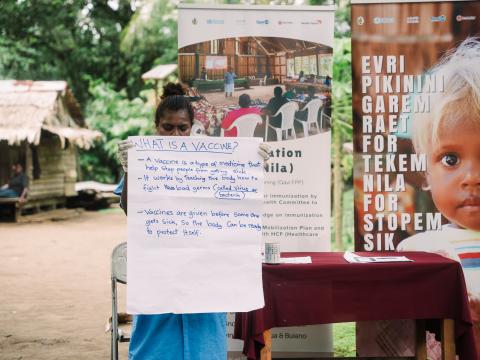Strengthening Health from the Ground Up: How Village Health Committees Are Transforming Immunization Outreach in Solomon Islands

Across the Solomon Islands, a quiet revolution in community health is gaining momentum. Through a GAVI-supported initiative led by the Ministry of Health and Medical Services (MHMS), WHO, and civil society partners, Village Health Committees (VHCs) are being revitalized to promote immunization awareness, strengthen local resilience, and reconnect communities with essential health services.
The project spans five provinces—Central Islands Province (CIP), Marau, Malaita, Makira, and Honiara City Council (HCC)—with a shared goal: to empower VHCs as grassroots health champions. These committees serve as vital bridges between remote villages and health facilities, ensuring that health messages reach every household, and that community voices shape local health priorities.
Key achievements include:
- Production and distribution of IEC materials in Pidgin with self-explanatory visuals.
- Immunization campaigns targeting remote areas, with a strong focus on mothers and caregivers.
- Joint planning sessions between health workers and VHCs.
- Development of a community engagement strategy co-designed with MHMS, WHO, and CSOs.
- Integration of gender and disability inclusion into the CBDRM manual.
- A sustainability plan to ensure MHMS continues supporting VHCs beyond the project.
“Solomon Islands has made progress in expanding vaccine access, but remote communities still face challenges,” said John, the EPI program officer in Kira Kira Hospital who presented during the Kokana awareness event. “Initiatives like this help bridge the gap.”
Makira’s Momentum: Kokana Community Leads with Creativity
Among the standout successes is the Kokana VHC in Makira Province, which recently conducted a vibrant community awareness session that blended education, creativity, and cultural relevance.
The event began with a locally performed drama that illustrated the importance of vaccines in a relatable, engaging way. Through storytelling and role-play, the drama showed how vaccines act as shields against dangerous diseases—especially for children and vulnerable groups.
Following the performance, VHC members delivered clear, accessible presentations based on their recent immunization training. Topics included:
- What immunization is and how vaccines work.
- The concept of herd immunity and why timely vaccination matters.
- Addressing vaccine hesitancy and common myths.
- The importance of the HPV vaccine for girls aged 9–14.
- Practical advice for managing mild side effects and when to seek help.
“Kokana’s drama and awareness session showed how powerful local storytelling can be in shifting health behaviors,” said Catherine, Community Development Facilitator for WVSI. “When communities lead the message, it sticks.”
The VHC also encouraged open dialogue, listened to community concerns, and shared tips on how to talk to hesitant parents using empathy, local success stories, and trusted sources like village nurses and elders.
Building Capacity for Long-Term Impact
Training sessions have equipped VHC members with skills in outreach planning, monitoring, and reporting. Communities have been mapped and linked to health focal points, creating a clear support structure. VHCs are now organizing village awareness sessions, putting savings aside to support their committee, and keeping simple immunization records to track progress. Health Committees have also shown interest in expanding their awareness sessions on immunization to neighboring communities.
Looking Ahead: Resilience and Sustainability
The project has underscored the importance of culturally adapted materials and flexible planning—especially across diverse regions. As the initiative moves forward, the focus is shifting toward climate resilience and realistic communication strategies to future-proof VHCs.
With an exit strategy in place, MHMS is poised to continue supporting VHCs beyond the project’s lifespan. The momentum built through GAVI’s support is now carried forward by empowered communities like Kokana—where storytelling, leadership, and local action are transforming health outcomes.
“To keep momentum, we need continued collaboration between health workers and VHCs,” said John Au Inomea. “Community trust and consistent outreach are key to long-term immunization success.”